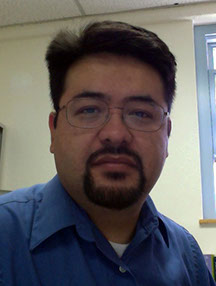News & Events
MSC03 2060
300 Terrace St. NE
Albuquerque, NM 87131-0001
Physical Location:
Clark Hall
Phone: 505-277-6655
chemistry@unm.edu
MSC03 2060
300 Terrace St. NE
Albuquerque, NM 87131-0001
Physical Location:
Clark Hall
Phone: 505-277-6655
chemistry@unm.edu

Profile: Dr. Rodolfo Tello-Aburto received his B.Sc. in Chemistry-Pharmacy-Biology from the Universidad Veracruzana in 1997. He received his M.Sc. in Organic Chemistry from the Universidad Nacional Autonoma de Mexico in 2002. Dr. Tell-Aburto was awarded a Ph.D. in Medicinal and Natural Products Chemistry from the University of Iowa in 2008. Dr. Tello-Aburto began a Postdoctoral Associate at the University of Minnesota in 2011. In 2013, Dr. Tello-Aburto became a Postdoctoral Researcher at New Mexico State University. He is currently an Associate Professor of Chemistry and the Principle Investigator of the Tello-Aburto Research Group at New Mexico Tech, Socorro, NM. His lab seeks to use chemistry to advance the understanding of biological processes involved in disease inception, progression and resistance development. Using natural products as inspiration and starting point, they are developing bioactive molecules with improved activities and desirable pharmacological profiles. The design of novel synthetic methodologies and their application to concise and practical synthetic sequences in their lab will allow rapid access to these biologically relevant molecules and their analogs.
Abstract: The Ubiquitin-proteasome pathway (UPP) is the major degradation pathway in eukaryotes for intracellular proteins. The inhibition of the UPP has been clinically validated as a target for the treatment of certain cancers. Several proteasome inhibitors are currently approved or in development, and despite recent progress, there is still a need for potent and more selective inhibitors. The cystargolides are two naturally occurring beta-lactones that showed promising activity as proteasome inhibitors. Their structure was assigned based on spectroscopic and degradation methods, but the absolute stereochemistry was not fully described. Our group has recently reported the first total synthesis of the cystargolides, and the work served to uncover their absolute stereochemistry. Moreover, we discovered two ester analogs that showed to inhibit the proteasome activity at low nanomolar concentration, and possess significant and selective growth inhibition activity against breast cancer cell lines. The talk will describe further medicinal chemistry developments on the cystargolide scaffold.
The hortonones A-C are a group of terpenoid natural products isolated from a collection of plants belonging to the genus Hortonia in Sri Lanka. Hortonone C showed interesting anticancer activity against MCF-7 cells, while hortonone A and B were not active. The structure of these natural products was determined based on spectroscopic methods, but their absolute configuration was not assigned. We designed a synthetic plan to prepare hortonone C and unveil its absolute stereochemistry. Two enantiocontrolled synthetic approaches will be discussed along with the details of the total synthesis of (-)-Hortonone C.